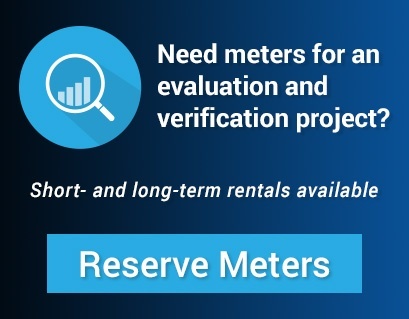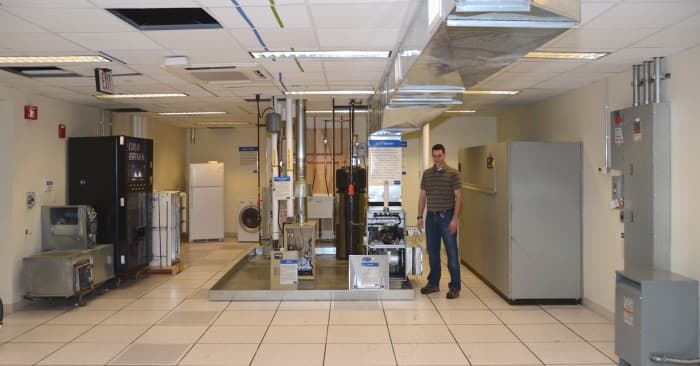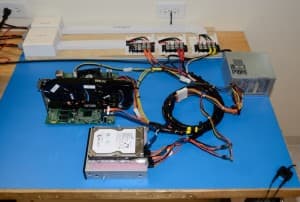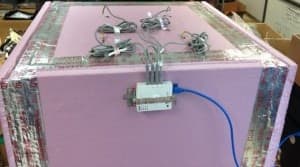Cadmus Laboratory Expands Knowledge of Energy-Efficient Technology
With an established history of providing state-of-the-art energy-efficiency evaluation, measurement, and verification support to the utility and built environment markets, Cadmus significantly enhanced its research and development (R&D) capabilities in this service area in summer 2012 with the construction of a full-service heating and cooling and engineering laboratory at its Waltham, Mass., headquarters. The laboratory allows Cadmus engineers to take a closer look at energy use by systems and appliances in order to help clients improve the design of their programs and products to use energy more efficiently.
Already a leader in metering buildings and building systems in the field, Cadmus can now use its laboratory to measure some of those systems in a controlled environment and research the energy use of appliances and electronics.
“We’re excited about our facility because it allows us to serve our clients in new ways and give them insights that help them improve their products and services,” says Andrew Machado, Cadmus energy engineer.
Extensive Range of Features
The 2,000-square-foot laboratory has a variety of features that enable Cadmus experts to test most building systems and appliances. The space boasts two environmental test chambers that can be precisely controlled at a range of temperatures; two 30-ton computer-room air conditioners that provide precise temperature and humidity control; a flexible raised-floor system that can be rearranged to simulate various airflow conditions; digital power meters capable of precise power monitoring; functional test models of a warm-air furnace, hydronic boiler, storage domestic hot water heater, heat pump domestic hot water heater, and ductless mini-split system; and power conditioning and uninterruptible power supply components.
The laboratory’s modular layout has the flexibility to meet a wide range of clients’ testing needs. In the short time since the opening of the facility, Cadmus has already tested a variety of systems, yielding insights for a diverse array of clients and partners.

Measuring Energy Use in Desktop Computers
In support of revising the ENERGY STAR® computer specification, a recent Cadmus study examined the individual elements that determine a computer’s energy use. Energy consumption by desktop computers has been dropping in recent years through increasing use of efficient components like low-power processors and efficient power supplies. ENERGY STAR® continues to evolve its specifications in light of changing technology to encourage industry to make computers ever more power-efficient and to ensure its label can help consumers choose the most efficient products.
One factor in determining a computer’s compliance with the ENERGY STAR® specification is matching its energy use to its components, such as additional memory. To pinpoint the sources of energy consumption in desktop computers, Cadmus metered the energy use in nearly 100 different component combinations, using equipment capable of accurately discerning power use down to a tenth of a watt.
Understanding Efficient Lighting and HVAC Interactions
While individual appliances can have an impact on a home’s energy efficiency, the interactions between home systems must be studied and well understood to achieve full benefits. The interaction between efficient lighting and systems that heat and cool homes is important in determining how much energy that lighting saves.
Cadmus performed detailed tests of recessed lighting to view how much of the heat given off by the light enters the living space and how much goes up into attics or between floors. The test’s results are already being used by utility programs to determine savings.
“Looking forward, the laboratory will allow Cadmus to grow its role as a thought leader in energy efficiency and help fill knowledge gaps in energy-efficiency programs,” declares David Korn, vice president of engineering for Cadmus’ energy services.
Building on Industry Knowledge Base
Cadmus laboratory specialists are using the facility to tackle areas where knowledge is limited. Though fluorescent lights have rated lives that are based on three hours of use each time the light is turned on, most lights in a home are used for much shorter periods on average. In summer 2013, Cadmus will begin an experiment in which more over 200 bulbs, including fluorescent and LED technologies, are turned on and off automatically for prescribed lengths of time and the resulting bulb lives are recorded. Results, expected in spring 2014 as bulbs begin to fail, will help determine the lifetime savings of future lighting programs.
In addition, the laboratory is already being used as a unique training facility for in-house and client staff. “We are using our laboratory as a live-training facility where our staff works directly on fully operational heating, air conditioning, and electrical systems,” says Matt Piantedosi, Cadmus’ lead for metering and safety. “No other firm in our markets has the ability to live-train staff to the extent that we do.”
Korn observes, “We’ll continue to add to the laboratory moving forward to meet the needs of our clients and our projects. The laboratory adds to our existing stock of $2.5 million of metering equipment and allows us to measure how buildings, building systems, and appliances work, whether in the field or in a controlled setting. We look forward to growing our knowledge and services in coming years.”


